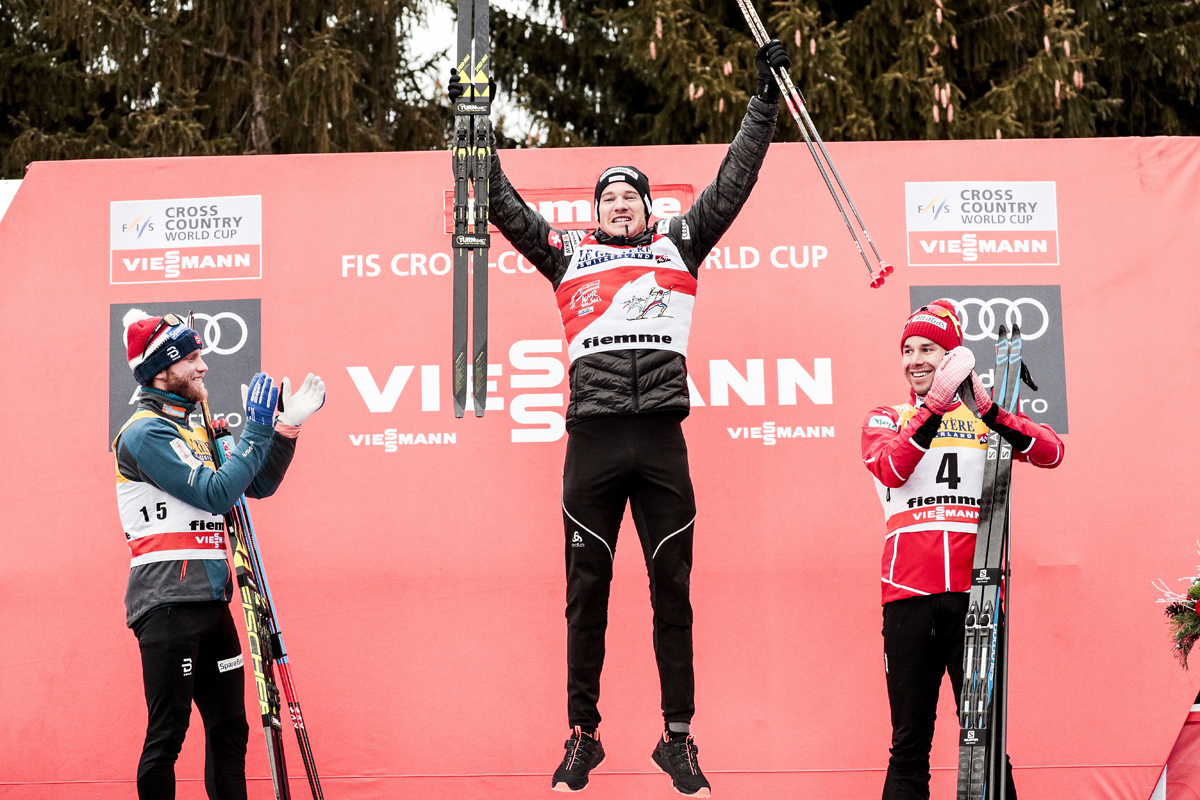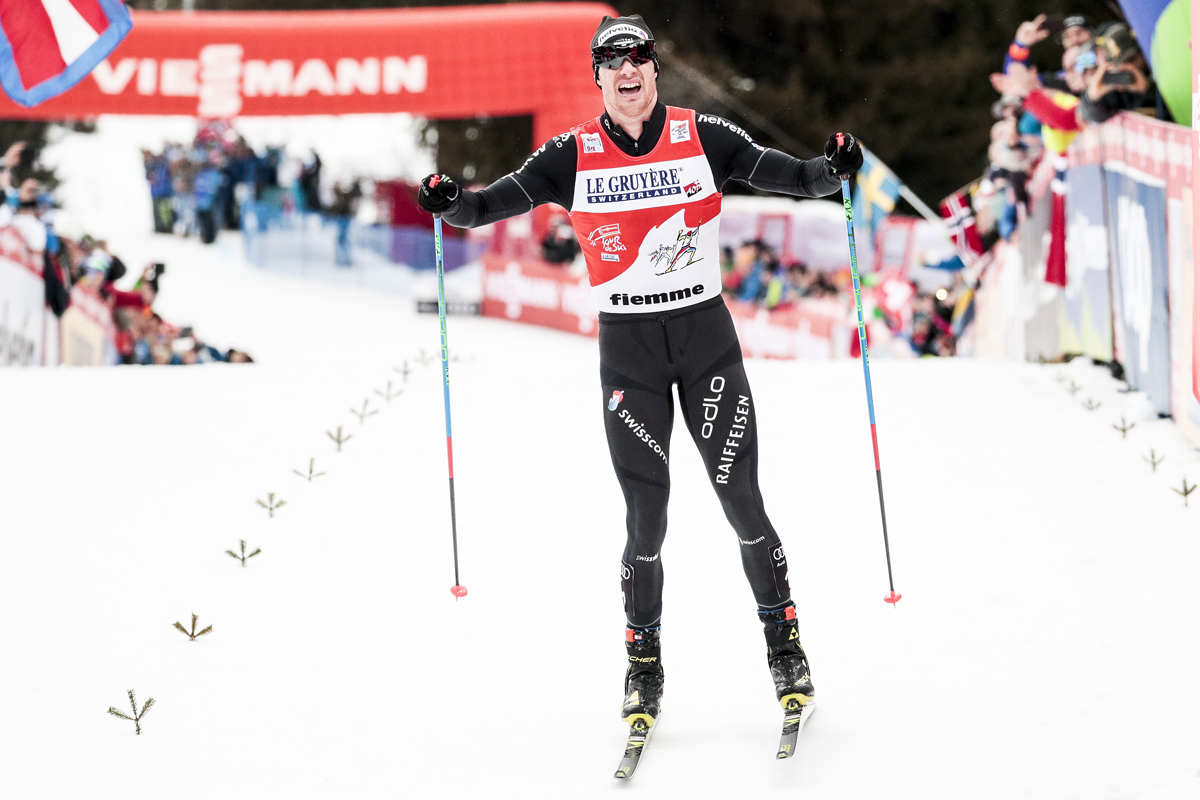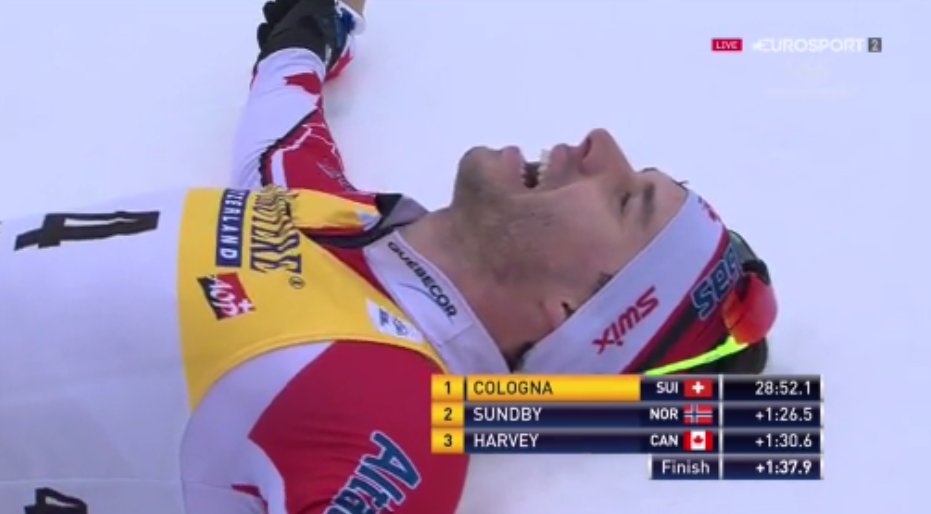
The 2018 Tour de Ski is a wrap. On Sunday in Val di Fiemme, Italy, the final Stage 7 hill climb was a mirage of sorts as Switzerland’s Dario Cologna soloed in for his fourth overall Tour de Ski (TdS) victory. The stage, a 9-kilometer freestyle pursuit “final climb” ascends an alpine ski-area slope for the final three k’s as it climbs 425 meters from race start to finish.
Not once did the 31-year-old Cologna look ready to crack. He was cool and calm during another hallmark performance for a skier who, before this year’s TdS, hadn’t stood atop a World Cup podium in three years (he broke through by winning the second stage of this year’s Tour: the 15 k classic in Lenzerheide, Switzerland). Cologna crossed the line Sunday atop Alpe Cermis in 28:52.1 minutes and recorded the fifth-fastest climb time of the day.
“Yes, it worked out very well,” Cologna said to Swiss broadcaster SRF, according to a translation. “I am very happy to arrive up here in first place, six years after the last time. It feels very good. It was a super Tour de Ski.”
Prior to the season, despite his past success, was considered a long shot for numerous podiums. In recent years, Cologna’s star appeared to be in slow-fade mode.
“You couldn’t expect it to work out like this,” Cologna told SRF of his overall win. “I had a good feeling, only the start of the season didn’t work out so well. But since the first race the sprint in the Tour things opened up for me, and after that, it worked out pretty well. No weaknesses, I could pull it through. And that in the end, it worked out so well with such a lead, I wouldn’t have expected that.”

With his three-year podium drought only satiated last week, Cologna is savoring the moment.
“It’s always beautiful,” Cologna said of winning his fourth TdS. “After the first year, they came quickly after each other. The first one surely was special. But as I said before, it’s also nice having to wait for a victory. So I am enjoying this one very much. I am happy that I could come back like this, and that I can still win big races.”
Post-Tour — although several World Cup weekends remain before the PyeongChang Opening Ceremony on Feb. 9 — in the overall calculus of who might arrive in form and a serious medal threat, add Cologna to that list.
“Of course that I am back, that I can beat everyone,” Cologna said of his form. “That surely is a good sign for myself, that everything is all right, and now it’s about preserving and showing this form at the Olympics.”
Cologna, wearing the red bib as the TdS leader skied off first on Sunday with a 1:15-minute gap on second placed skier Alexey Poltoranin of Kazakhstan. Canada’s Alex Harvey started third (+1:23) followed by Russia’s Alexander Bolshunov fourth (+1:40) and Norway’s Martin Johnsrud Sundby fifth (+1:42). Coming into the stage, last season’s TdS overall winner Russian Sergey Ustiugov was third overall (+1:22), but he did not start the final climb.
According to a translation of an SRF interview with Russian coach Markus Cramer, Ustiugov could barely move his head back and forth as a result of his crash during the Stage 5 mass start in Oberstdorf, Germany. Cramer claimed the injury was again aggravated in Saturday’s Stage 6 classic mass start in Val di Fiemme.
The opening kilometers of the race feature higher-speed, slightly descending terrain with a few rollers in the opening k. Clear from the start was that Cologna wouldn’t cede any seconds as he approached the climb, which begins to kick up around 6.2 k.
The facts are Cologna skied with such poise that his performance seemed almost quotidian. The Swiss skier was never challenged. At 6.2 k, Harvey and Poltoranin were paired 1:17.8 minutes back, in second and third. Sundby and Bolshunov came through 22 seconds later.
This was the real drama — the battle for the second and third steps on the podium — Cologna was a lock all along for his final bow across the line. None of the four chasers tempted the folly of trying to gap up to the Swiss skier and risk blowing up before the finish.
Poltoranin, winner of Saturday’s 15 k classic mass start, is hyped as a classic specialist. If anyone waited for the 30 year old to collapse early on the Alpe Cermis’s flanks, it did not happen. He stuck on Harvey as the Canadian set the tempo. And just behind, at 7.1 k, Sundby’s podium hunting looked more real as he pulled Bolshunov and himself near the tails of Poltoranin’s skis.
Through another kilometer of gradients measuring 26.5 percent, 14.3 percent, and then 24 percent — climbs steep enough on the skinny skis to check for a malfunctioning inclinometer — Sundby matched Harvey, and Poltoranin matched Bolshunov. The foursome came through the time check with a four-second difference from Harvey to Poltoranin.

“I knew Sundby would come by us at one point,” Harvey said on the phone after. “The plan was to hopefully hit the base of the hill away from Sundby, and hit it at my own pace to not have to go his pace right away. Because last year I was skiing with Manificat and Heikkinen, for example, and Cologna was like 20 seconds ahead of us maybe at the base of the hill, and they just started charging so hard that it just put me in the red too early. So the plan was to just go my own pace at the base of the hill and then whenever Sundby catches me be ready to react to that.”
Sundby caught Harvey in the first third of the climb and paced behind the Canadian. At 8.5 k, moving through tight switchbacks, the 21-year-old Bolshunov broke — his redlining engine defaulted to a more moderate gear. Bolshunov lost 20 seconds quickly as Sundby, Harvey and Poltoranin forged ahead, all fighting for second and third place.
“Sundby stayed behind me until the halfway point of the climb and then took over took the lead,” Harvey recalled. “By then I was feeling OK. I just had to stay strong and stay on him. When I saw Bolshunov was getting dropped it was really motivating for me. You are suffering so bad by then at least you are thinking there is another guy who are suffering even more than me.”
Cresting the steeps on the Alpe Cermis climb with about a kilometer to go, Poltoranin had faded back.
“When finally I actually saw that Poltoranin was getting dropped as well, I thought this is really good,” Harvey said. “But then I was also starting to feel pretty tired. I still tried to go by Sundby at the end, he had a little bit more than me. It is good terrain for him, a steady climb like that. He is such a strong climber — it was simply good I was able to just hang onto him until the end.”
It was Sundby and Harvey left to parry. Harvey is a closer. But on this day, Sundby held out for second place (+1:26.5) and Harvey third (+1:30.6).
Poltoranin placed fourth (+1:41.7), Norway’s Hans Christer Holund fifth (+3:09.7) and Bolshunov suffered an epic slow down to finish in sixth (+3:09.7). Bolshunov skied the 34th-ranked climb time (out of 43 finishers) in 17:40.6 minutes.
Harvey’s third place marks a big step in his TdS performances. In 2016, the 29-year-old Quebec native was 14th overall and had the 16th-fastest time on the final hill climb stage. The 2017 TdS saw Harvey seventh overall with the 25th-fastest climb time. On Sunday, Sundby clocked the fastest climb time in 15:58.3 and fastest time of day on the entire course in 28:36.4. Harvey skied the seventh-fastest climb time (+26.7) and sixth-fastest course time (+23.6).
“I thought it was probably the best year for that,” Harvey said about his TDS podium prospects. “But I mean, that climb has been just so bad for me over the years. It was kind of best-case scenario. But honestly, I don’t know how much I believed in it.”
There were a couple years Harvey didn’t finish the Tour because of a circulation issue he had in his legs that worsened with climbing. He had surgery in the spring of 2015 to remedy that.
Before that, in 2011, Harvey started the final stage seventh overall and finished 20th. In 2012, Harvey began the final hill climb pursuit in sixth overall — he ended the day and the Tour 40th overall.
“I am just so bad on the climb. I was hoping for [a podium], but it was just hard for me to fully believe in it because of all the previous experience,” Harvey explained. “I have been well-ranked up until the last stage a few years in a row, but just never been able to quite do it on the last stage. I knew the shape was more solid than ever, but there was still a bit of a question mark for me for the Alpe.”

On Sunday, that question for Harvey was answered. Harvey will take a two-day recovery period in Val di Fiemme and then begin a 10-day altitude camp with Canadian teammate Devon Kershaw in Seiser Alm. Harvey said he would then train in Livigno as part of his pre-Olympic altitude camp.
For the U.S., Paddy Caldwell was the only male skier remaining in the TdS. He began the day ranked 44th overall of 46 skers. Although he was 10:53 minutes behind at the start, Caldwell began in a wave of skiers released en-mass 10 minutes after Cologna. Caldwell ended his first TdS having moved up to 38th overall (+11:54.8) after skiing the 20th fastest climb time in 17:04.7 (and 22nd-fastest pursuit time, 1:18 behind Sundby).
With the conclusion of the Tour de Ski, racing continues next weekend in Dresden, Germany, with a skate sprint Saturday and skate team sprint on Sunday. The next distance race on the World Cup will be a 10/15 k classic in Planica, Slovenia, on Jan. 21.
Stage 7 results (including ‘Climb Time’) | ‘Winner of the day’ | Final Tour de Ski standings
Jason Albert
Jason lives in Bend, Ore., and can often be seen chasing his two boys around town. He’s a self-proclaimed audio geek. That all started back in the early 1990s when he convinced a naive public radio editor he should report a story from Alaska’s, Ruth Gorge. Now, Jason’s common companion is his field-recording gear.



